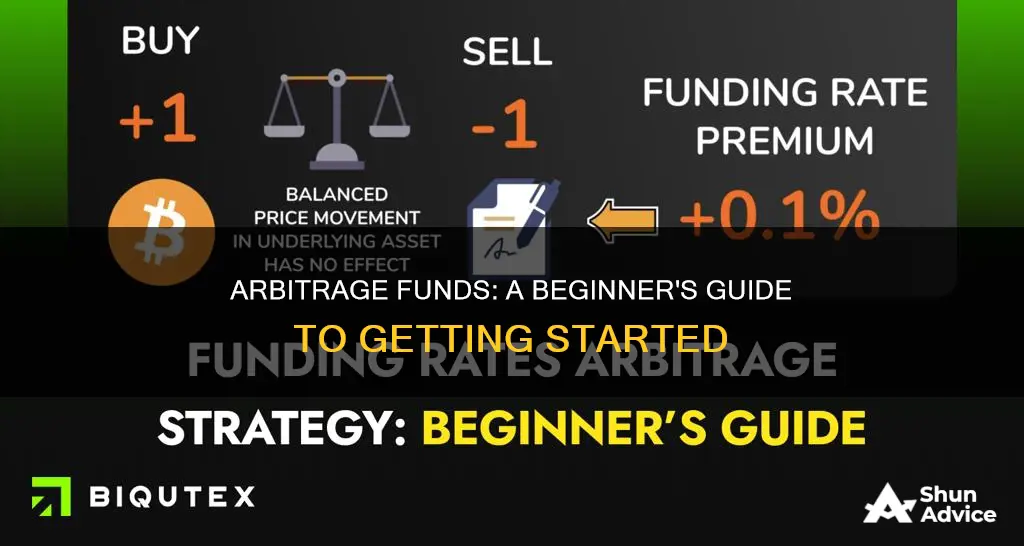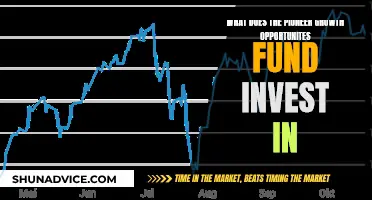
Arbitrage funds are a type of mutual fund that aims to profit by buying and selling securities across different markets to take advantage of price differences. This strategy, known as arbitrage, involves purchasing an asset in one market and selling it simultaneously in another market at a higher price, allowing investors to profit from market volatility with minimal risk. While arbitrage funds are considered low-risk, they also have unpredictable payoffs due to the small profit margins on each trade. Before investing, it is crucial to understand how arbitrage funds work and if they align with your financial goals and risk tolerance.
| Characteristics | Values |
|---|---|
| Definition | Arbitrage funds are a type of mutual fund that aims to buy and sell securities in different markets to profit from price differentials. |
| Who is it suitable for? | Arbitrage funds are suitable for investors who want to profit from volatile markets without taking on too much risk. They are also suitable for those with short to medium-term financial goals. |
| Risk level | Arbitrage funds are considered low-risk because each security is bought and sold simultaneously, eliminating the dangers associated with long-term investing. |
| Returns | Returns are moderate due to the small difference in value between markets. To see substantial gains, a large number of trades must be executed. |
| Taxation | Arbitrage funds are taxed as equity funds. Long-term capital gains are taxed at 10% without indexation, and short-term capital gains are taxed at 15%. |
| Investment horizon | Arbitrage funds are suitable for investors with a short to medium-term investment horizon of 3-6 months or more. |
| Costs | Arbitrage funds charge an annual expense ratio, which includes the fund manager's fee and fund management charges. They may also levy exit loads for early withdrawal. |
What You'll Learn

Understanding arbitrage funds
Arbitrage funds are a type of mutual fund that aims to profit from price differentials in different markets. They do this by buying and selling securities simultaneously in two distinctive markets. For example, they may purchase stocks in the cash market and sell them in the futures market, or vice versa, depending on the market conditions. This allows arbitrage funds and their investors to profit from any slight price differences between these markets.
The cash market is where transactions are settled immediately, or 'on the spot'. In contrast, the futures market involves buying or selling assets at a predetermined price on a future date. The most important types of arbitrage occur between these two markets, although the price differences are often very small. As a result, arbitrage funds must execute a large number of trades to make substantial gains.
The price differential between assets in different markets should theoretically be the same, but market inefficiencies create arbitrage opportunities. Arbitrage funds can, therefore, be used to ensure that prices do not deviate substantially from their fair value for long periods.
Arbitrage funds are considered low-risk because each security is bought and sold simultaneously, eliminating the dangers associated with long-term investing. They are also taxed as equity funds, which can be beneficial for investors in higher tax brackets.
However, the payoff can be unpredictable as arbitrage funds are not very profitable during stable markets. The high number of trades required by arbitrage funds can also result in high expense ratios.
Overall, arbitrage funds can be a good choice for investors who want to profit from volatile markets without taking on too much risk.
Strategies for Investing Like a Hedge Fund Manager
You may want to see also

How arbitrage funds work
Arbitrage funds are a type of mutual fund that aims to profit from price differentials in different markets. They do this by buying and selling securities simultaneously in two distinct markets. This allows investors to benefit from any price discrepancies, which are often small, and as such, a large number of trades must be executed to see substantial gains.
For example, a fund manager may spot that the stock of XYZ Limited is selling at Rs. 1000 per share on the Bangalore Stock Exchange (BgSE) and at Rs. 1010 per share on the Ahmedabad Stock Exchange (ASE). The manager will then buy shares from BgSE and sell them on the ASE, profiting Rs. 10 per share (minus transaction costs).
Another example is a fund buying a stock at $57 on the New York Stock Exchange (NYSE) and immediately selling it at $57.15 on the London Stock Exchange (LSE).
The two main markets where arbitrage funds operate are the cash market, where transactions are settled on the spot, and the futures market, where assets are bought or sold at a predetermined price on a future date.
Arbitrage funds are considered low-risk because each security is bought and sold simultaneously, meaning there is virtually none of the risk involved with longer-term investments. They are also taxed as equity funds.
A Guide to Investing in Vanguard's Total Market Index Funds
You may want to see also

Arbitrage fund managers
The role of an arbitrage fund manager is to:
- Identify securities or assets trading at different prices in the cash market (spot) and the derivatives market (futures and options).
- Purchase the security at a lower price in the cash market.
- Simultaneously sell an equivalent amount of the security in the derivatives market at a higher price.
- Repeat this process to generate returns over time.
- Aggregate small gains from multiple arbitrage opportunities to contribute to the fund's overall returns.
It is important for arbitrage fund managers to have a strong understanding of the market and the ability to identify price differentials between similar securities. They also need to be able to act quickly to take advantage of these opportunities.
Overall, the role of an arbitrage fund manager is to identify and exploit price differences between markets to generate risk-free returns for investors.
Mutual Fund Investment: Smart Money Moves to Make Now
You may want to see also

Who should invest in arbitrage funds
Arbitrage funds are a good investment option for those who want to profit from a volatile market without taking on too much risk. They are also suitable for investors with a low-risk appetite and those who are new to investing. These funds are considered low-risk because they involve the simultaneous buying and selling of securities, eliminating the dangers associated with long-term investing.
Arbitrage funds are also a good option for those with short to medium-term financial goals. They can be used to park excess funds and create an emergency fund, earning higher returns than a traditional savings account. Additionally, arbitrage funds are taxed as equity funds, which may be beneficial for investors in higher tax brackets.
However, it is important to note that arbitrage funds have unpredictable payoffs and high expense ratios. The payoff can be unpredictable because the funds are not very profitable during stable markets. The high number of trades required by successful arbitrage funds leads to high expense ratios. Therefore, arbitrage funds should not be the only type of investment in a portfolio.
When choosing an arbitrage fund, investors should consider the fund's size, the track record of the fund house, the consistency of its performance, and the expense ratio. It is also important to ensure that the fund has a decent corpus size, a low expense ratio, and an experienced fund manager.
A Guide to Investing in the 10T Fund
You may want to see also

Arbitrage fund risks and considerations
Arbitrage funds are a type of mutual fund that can be a good choice for investors who want to profit from a volatile market without taking on too much risk. However, there are some risks and considerations to keep in mind before investing in arbitrage funds.
Firstly, it's important to understand how arbitrage funds work. Arbitrage funds aim to profit from price differentials in different markets, such as the cash and futures markets or pricing mismatches between exchanges. They buy and sell securities simultaneously in these markets, taking advantage of slight price differences. While this strategy can be profitable, it relies on volatile markets and a large number of trades to generate substantial gains. As a result, arbitrage funds may not perform well in stable markets and can have unpredictable payoffs.
Another consideration is the expense ratios associated with arbitrage funds. Due to the high number of trades required, the expense ratios of arbitrage funds can be quite high, impacting the overall profitability of the investment.
Additionally, arbitrage funds are taxed as equity funds, which means long-term capital gains are taxed at a lower rate than ordinary income tax rates. However, short-term capital gains are taxed at a higher rate than long-term capital gains.
Arbitrage funds are also subject to interest and credit risks, although these are minimal as the funds typically invest in short-term debt instruments.
Finally, it's important to note that arbitrage funds are not suitable for all investors. They are generally recommended for new investors and those with a low-risk appetite due to their minimal risk and stable returns compared to other investments. However, investors should carefully consider their financial goals and risk tolerance before investing in arbitrage funds or any other type of investment.
Launching an Investment Fund: Ontario's Essential Guide
You may want to see also
Frequently asked questions
Arbitrage funds are a type of mutual fund that aims to profit from price differentials in various markets. They do this by buying and selling securities simultaneously in two different markets.
Arbitrage funds are suitable for investors who want to profit from volatile markets without taking on too much risk. These funds are also good for those with short to medium-term financial goals, and those who want to park excess funds to create an emergency fund with higher returns than a savings account.
Arbitrage funds are considered low-risk as securities are bought and sold simultaneously. However, the payoff can be unpredictable as it relies on market volatility and the number of arbitrage opportunities available. Returns are typically moderate, and funds must execute a large number of trades to make substantial gains.
You can invest in arbitrage funds through an intermediary or an Asset Management Company (AMC). It is recommended that you speak to an investment advisor to understand how to best take advantage of arbitrage funds.







